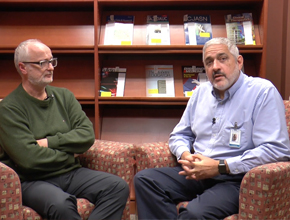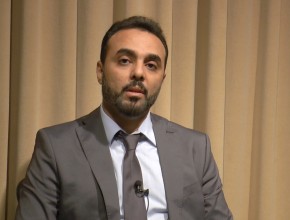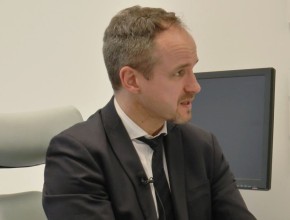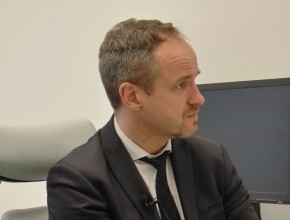References
Colorectal Cancer Screening. Cancer Care Ontario. https://www.cancercare.on.ca/pcs/screening/coloscreening/?WT.mc_id=/colorectalscreening. Accessed May 22, 2017.Roman Jaeschke: Good afternoon. Welcome to another edition of McMaster Perspective. I would like to introduce to you Professor David Morgan. Why don’t I ask you to introduce your credentials?
David Morgan: Roman and I have known each other for many, many years. I am a gastroenterologist here, at St. Joseph’s Hospital, and faculty at McMaster University. I have worked here since I finished training in 1990. In terms of what I have done over the years besides clinical gastroenterology, I have held the presidency for the Canadian Association of Gastroenterology, I am the vice-president of the Ontario Association of Gastroenterology, and what is relevant to colon cancer screening is that I am the Provincial Clinical Lead for the Quality Management Program, which is a partnership between Cancer Care Ontario and the Royal College of Physicians and Surgeons of Canada. It was mandated by the provincial government in 2013 to come up with a quality framework for colonoscopy in the province of Ontario.
RJ: Thank you. As you have probably guessed, we are going to talk today about colon cancer screening. Maybe we will start first by describing the scope of the problem. How prevalent is colon cancer?
DM: Unfortunately, in Ontario it is a big deal. Cancer of the colon is the second or third – depending on your sex – highest cause of cancer death in Ontario. So you are looking at a chance of about 1 in 19 over the course of your life of coming up with a colon cancer. That is much, much higher than in many parts of the world. Obviously, it is a big deal for our health-care system because of the volumes of patients. It is a big deal if you get the cancer. Luckily, colon cancer is something we can detect and prevent. If you get it, it is something that we have a relatively good cure rate for, so your chance of surviving at 5 years – if you catch it early – is very good, up over 90%. But if you get a recurrent cancer or you have a cancer that is not found till very late [stage], it is a nasty disease and quite miserable for the patient, so it is a big burden.
RJ: One in 19 – does it depend on whether you are male or female?
DM: There is very little difference between males and females. There is probably some difference; men are more likely to have polyps, for example. [There are also] racial differences: Caucasians are a bit less [at risk] than some of the other races. The family history is a really big deal. If you have got a first-degree relative with colorectal cancer, your risk goes up very substantially, and the more first-degree relatives you have, the higher your risk as well, which, again, allows us to identify people who are at higher risk, it allows us to effectively screen for the problem.
RJ: First-degree relative means…
DM: Mom, dad, sister, brother, or children. If it is your grandparents, your second cousin, or your uncle, your risk is not as high.
RJ: And it depends on the age at which the cancer…
DM: Exactly right. Sixty seems to be the magic cutoff point. If there is an “average” colorectal cancer patient, that would be someone over the age of 60. If, for example, you were diagnosed with your dad having colon cancer at the age of 40, that is a big deal, your risk goes up higher again, and you would start screening earlier. Those are the sorts of higher-risk people.
RJ: Because it is relatively prevalent, there have been plans to screen for colon cancer for a number of years. Could you go with us over the history of screening?
DM: Screening has been around for a while. There has been a number of guidelines. The first Canadian guidelines came out in 2004: the Canadian Association of Gastroenterology put forward a paper – which was not the true guidelines that they develop now, with Delphi panels and multiple questions and detailed literature. In 2004, it was more of a review of the literature that was out there; for example, the British Society of Gastroenterology, who had just put out the recommendation.
We have evolved from 2004. The programs started more than 6 years ago. Ontario was the first province in the country to have a program, province-wide, for colorectal cancer. Some of the most recent additions have only been in the last couple of years, but the whole country does indeed have programs now in each province.
RJ: How do we screen?
DM: In Ontario, Cancer Care Ontario has had guidelines that are very close to the Canadian Association of Gastroenterology guidelines, where they say that the entire province should be screened between the ages of 50 and 74 years with a fecal occult blood test, with the caveat that if you have got a family history – so first-degree family history – you should have colonoscopy as the screening modality, and people who are fecal occult blood test-positive should have colonoscopy ideally within 8 weeks of the time that they were showing this positive test.
RJ: So today’s guidelines, if I hear correctly, is to screen everybody on the population level with a fecal occult blood test and do colonoscopies of those with positive tests or those with a strong family history.
DM: Exactly right.
RJ: Where does sigmoidoscopy fit into that?
DM: Sigmoidoscopy is interesting too. We have never had the programmatic screening for sigmoidoscopy…
RJ: Programmatic meaning based on a program?
DM: Based on a province-wide program. Again, Ontario was the first place in Canada where we have had nurse-performed flexible sigmoidoscopy programs. The reason for that being, there were several very large prospective studies, particularly from the United Kingdom several years ago, that showed that sigmoidoscopy was a good screening modality [in terms of] all the screening parameters, so it is safe, it is accessible, it is chosen by patients, and it has good results. If you had a flexible sigmoidoscopy, you were shown to be less likely to die from colon cancer within 10 years. So as a screening tool it did work well. We have a number of centers still up and running. At McMaster University, there is a screening program with nurse-performed flexible sigmoidoscopy. We had one at St. Joseph’s Hospital. Unfortunately, our nurses retired, so we do not have one at this facility, but there is a number of facilities across the province. Flexible sigmoidoscopy programs are being brought into the province-wide screening program, but they are not considered because of the limitations; it is not available to everyone in every site.
RJ: So what you are telling me, it is really a fringe program at the moment, not necessarily widespread and possibly not used around the world?
DM: Not used everywhere. It is certainly used in Europe more than here. It is well recognized from the data that it is a good screening tool. In Ontario, it is limited; again, mainly by the number of sites that it is available in. It is well accepted, it is easy, you do not require a preparation, and you do not require sedation.
 English
English
 Español
Español
 українська
українська











